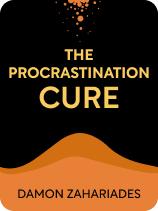

This article is an excerpt from the Shortform book guide to "The Procrastination Cure" by Damon Zahariades. Shortform has the world's best summaries and analyses of books you should be reading.
Like this article? Sign up for a free trial here.
Do you have trouble keeping track of your to-do items? How do you manage tasks to stay organized?
Throughout The Procrastination Cure, Damon Zahariades mentions a few tools that he suggests you include in your system for managing your time and tasks. We’ve collected his tips and tricks for using lists and schedules to support your success.
Learn how to manage tasks and stay on top of things below.
The Lists You Need to Succeed
There are at least three lists Zahariades suggests you maintain to know how to manage tasks. First, make a list of your short-, medium-, and long-term goals. Next, create a master to-do list of all your commitments. Use this to create your daily to-do list, which includes only the things you’re planning to do today. (Zahariades also mentions having additional, context-specific to-do lists, but he doesn’t go into detail about how these fit in to the rest of the system.) The final organizational component is a calendar where you can keep track of appointments and plan out your day. Next, we’ll take a closer look at how to use these tools.
(Shortform note: Zahariades’s method of managing tasks has a lot in common with the personal organization system David Allen describes in Getting Things Done. Allen recommends keeping a master list of “Projects” that have more than one step, along with several context-specific lists of “Next Actions” that show only the immediate next step to take. Allen explains that time and energy are wasted remembering what you need to do at moments when you can’t actually do it. Therefore, he proposes grouping tasks by the setting, people, or circumstances required to perform them. Instead of a general to-do list, you might have separate lists of calls to make, errands to run, and tasks around the house; you’d consult each list at the appropriate time.)
Get Clear on Your Goals and Priorities
To prevent your to-do lists from becoming cluttered or outdated as priorities change, Zahariades recommends you revisit them regularly with the following tips in mind:
- Review your master to-do list every week, alongside your goals list, and remove or re-prioritize items as appropriate so your list never gets cluttered.
- Assign every item on your to-do list a priority level. Use your goals list to evaluate which tasks are most important to your goals and which are urgent.
- Limit your daily to-do list to seven items or fewer so that you can actually accomplish everything on the list. Review the list each morning and remove any non-essential tasks.
(Shortform note: In Getting Things Done, David Allen also stresses the importance of frequently reviewing and updating your lists of short- and long-term tasks. You do so through what he calls the “Weekly Review,” where you go over your lists, process new information, and decide what to do now, do later, delegate, and eliminate.)
Scheduling and Time Management
Zahariades recommends several practices that increase your awareness of and control over how you spend your time and tackle your to-do list:
- Decide ahead of time how you’ll schedule your day, including what tasks you’ll work on when, so that you only take free time as planned.
- Set a time limit for every task on your to-do list. Then shorten the time, recognizing that work will expand to fill the time you allow for it.
- Split up long blocks of time into manageable chunks with breaks in between each one. Use a timer to keep track. Group similar tasks together.
- Track your energy levels at different times of day to understand when you usually feel most energetic, and schedule your most challenging tasks for those times.
- Stop multitasking. Doing more than one thing at once doesn’t make you more productive, but it gives you a false sense that you’re getting a lot done.
(Shortform note: Time management tools is one area where Zahariades contradicts David Allen’s advice. In Getting Things Done, Allen is adamant that you shouldn’t schedule what you plan to do in a day; in fact, he doesn’t recommend making a daily to-do list. Most people’s work, Allen argues, is subject to constant changes and interruptions, which will make it difficult to stick to any plan you make for your day; rather than watching your schedule fall apart, build in flexibility from the beginning. He says you should reserve your calendar only for time-specific commitments (like meetings) or tasks that absolutely have to be done that day. The rest of the time, choose from your context-specific lists of tasks, all of which are high-priority.)

———End of Preview———
Like what you just read? Read the rest of the world's best book summary and analysis of Damon Zahariades's "The Procrastination Cure" at Shortform.
Here's what you'll find in our full The Procrastination Cure summary:
- Advice from a former chronic procrastinator on how to stop procrastinating
- How to get to the bottom of what drives you to procrastinate
- How to use lists and schedules to manage your time and tasks






